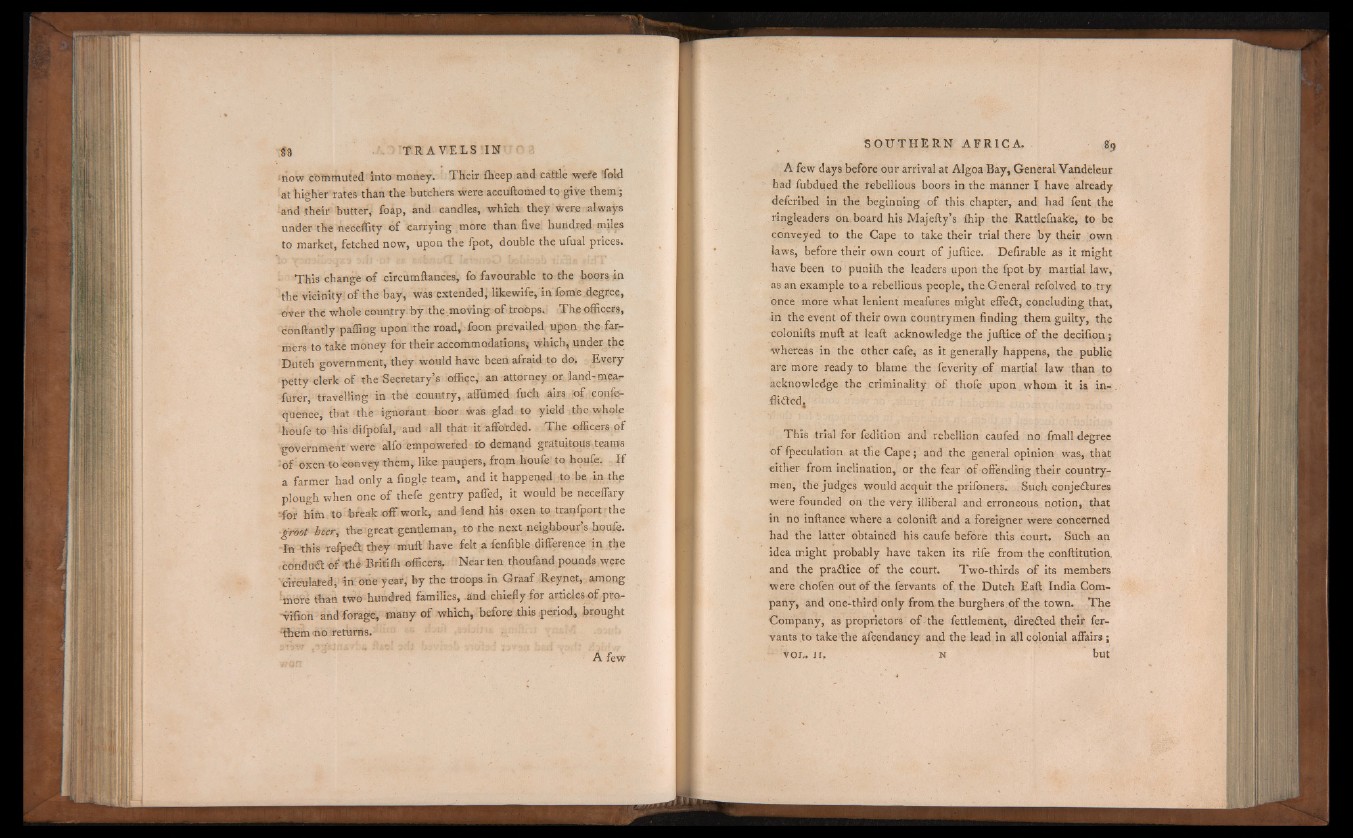
•now commuted into money. Their fheep. and cattle were Told
at higher rates than the butchers were accuftomed to give them;
and their butter, foap, and candles, which they were always
under the neceffity of carrying more than five, hundred miles
to market, fetched now, upon the fpot, double the ufual prices.
This change of circumftances, fo favourable to the boors in
the vicinity of the bay, was extended, likewife, in fom’e degree,
over the whole country by the moving of troops. The officers,
conftantly pafling upon the road, fbon prevailed upon the farmers
to take money for their accommodations, which, under the
Dutch government, they would have been afraid to do. Every
petty clerk of the Secretary’s office, an attorney or land-mea-
furer, travelling in the country, affumed fuch airs ¡of eonfe-
quence, that the ignorant boor was glad to yield the whole
houfe to his difpofal, and all that it afforded. The officers of
•government were alfo empowered to demand gratuitous,teams
-of oxen to convey them, like paupers, from houfe to houfe. If
a farmer had only a fingle team, and it happened, to be in the
plough when one of thefe gentry paffied, it would be neceffary
Tor him to break off work, and lend his oxen to tranfport the
groat heer, the great gentleman, to the next neighbour’s houfe.
In this refpedt they muft have felt a fenfible difference in tfie
conduct of the Britifh officers. Near ten thoufaod pounds were
circulated, in one year, by the troops in Graaf Reynet, among
'more than two hundred families, and chiefly for articles of pro-
-vifion and forage, many of which, before this period, brought
them mo ¡returns.
A few
A few days before our arrival at Algoa Bay, General Vandeleur
had fubdued the rebellious boors in the manner I have already
defcribed in the beginning of this chapter, and had fent the
ringleaders on board his Majefty’s fhip the Rattlefnake, to be
conveyed to the Cape to take their trial there by their own
laws, before their own court of juitice. Defirable as it might
have been to puniih the leaders upon the fpot by martial law,
as an example to a rebellious people, the General refolved to try
once more what lenient meafures might effedt, concluding that,
in the event of their own countrymen finding them guilty, the
colonifts muft at leaft acknowledge the juftice of the decifion;
whereas in the other cafe, as it generally happens, the public
are more ready to blame the feverity of martial law than to
acknowledge the criminality of thofe upon whom it is in-.
fli£ledt
This trial for fedltlon and rebellion caufed no fmall degree
of fpeculation at tfie Cape; and the general opinion Was, that
either from inclination, or the fear of offending their countrymen,
the judges would acquit the prlfomers. Such conjectures
were founded on the very illiberal and erroneous notion, that
in no inftance where a colonift and a foreigner were concerned
had the latter obtained his caufe before this court. Such an
idea might probably have taken its rife from the conftitution.
and the pradtice of the court. Two-thirds of its members
were chofen out of the fervants of the Dutch Eaft India Company,
and one-third only from the burghers of the town. The
Company, as proprietors of the fettlement, diredted theif fervants
to take the afcendancy and the lead in all colonial affairs ;
vol.. 11, n but